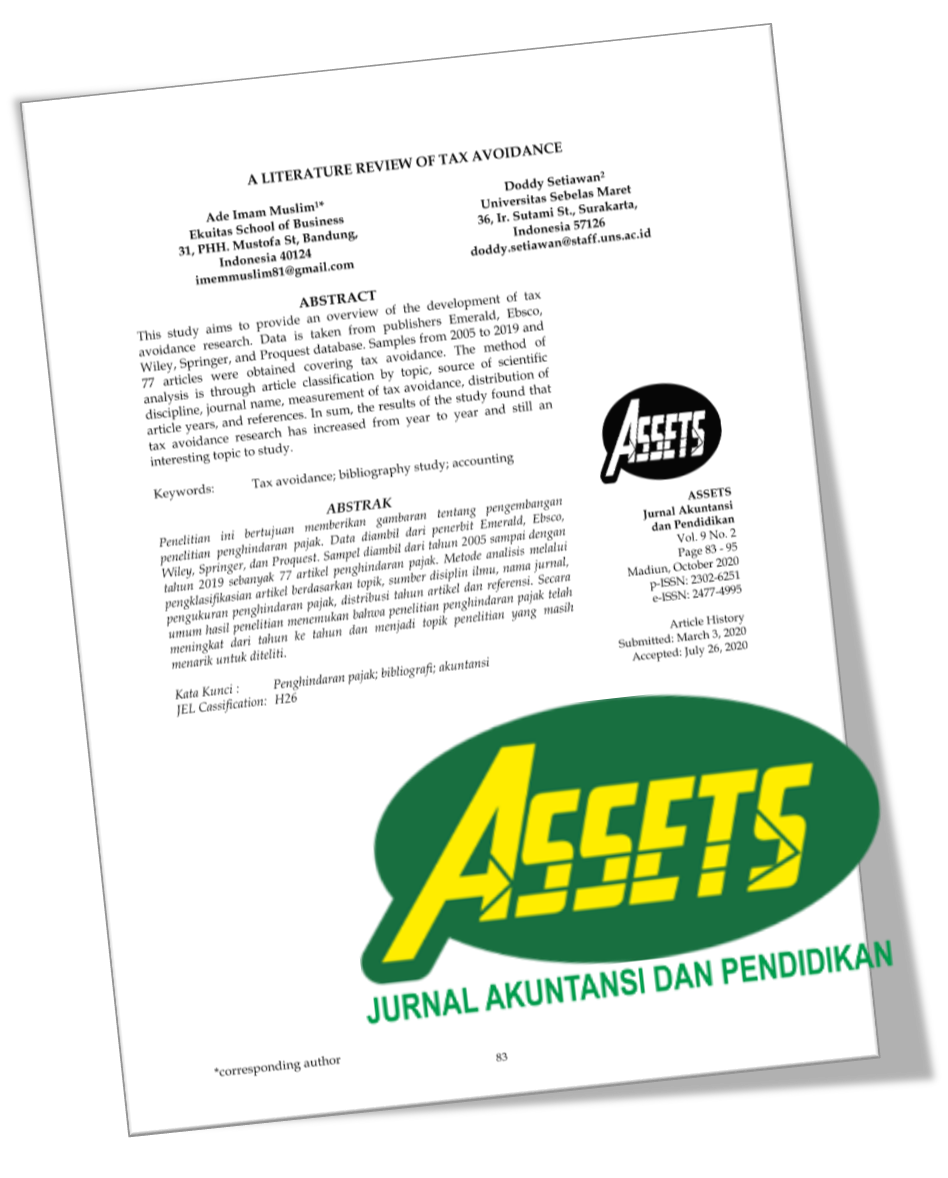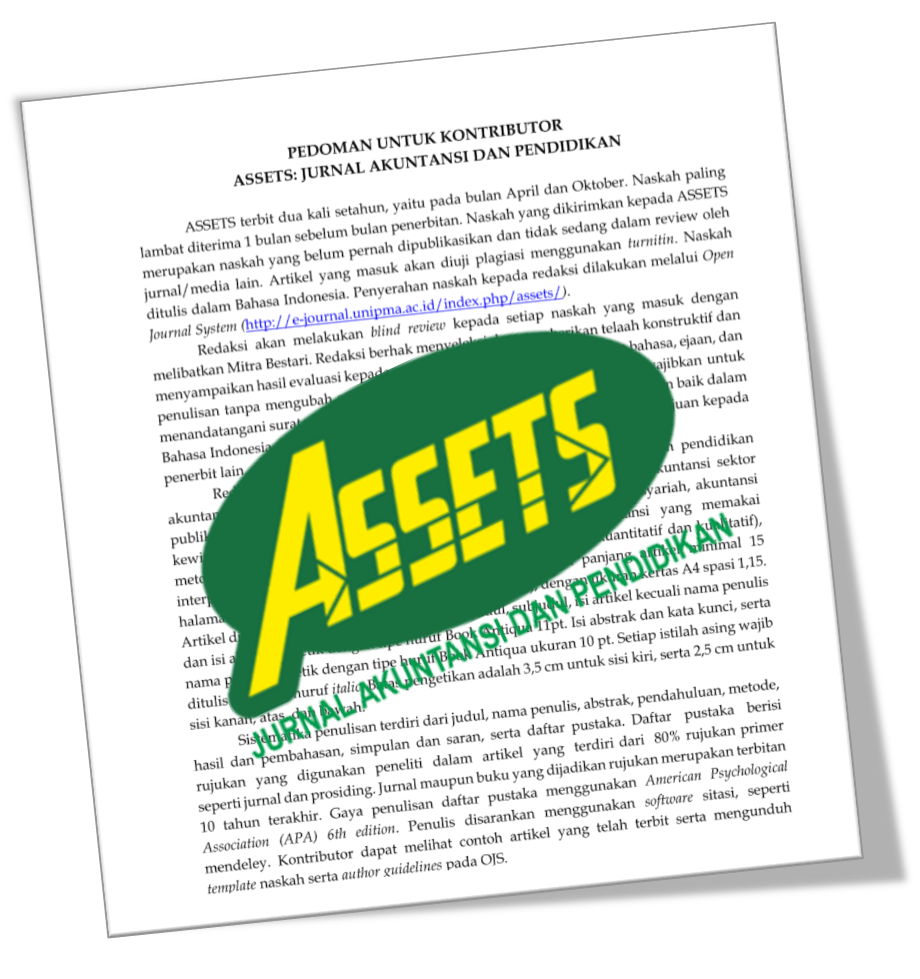Prevention and Detection of Fraud in Village Fund Supervision in Barito Kuala District
DOI:
https://doi.org/10.25273/jap.v9i2.4941Keywords:
Village fund, Fraud, Fraud prevention, Fraud detection, Dana desaAbstract
ABSTRACT
The purpose of this study is to map the pattern of the village fund supervision system and detect the possibility of loopholes in the system. So that it can provide recommendations for strategy formulations that are able to prevent fraud in village fund management. This research uses qualitative methods with a case study research strategy. The results showed that there was no fraud found in the three research objects, but the potential for fraud still exists and can change to be fraud due to lack coordination of supervision between related institutions and unsolid whistleblowing system. This paper offers strengthening internal control and whistleblowing system to address issues concerning the village fund supervision system.
ABSTRAK
Tujuan penelitian ini adalah memetakan pola sistem pengawasan dana desa dan mendeteksi kemungkinan adanya celah (loopholes) fraud dari sistem tersebut sehingga dapat memberikan rekomendasi strategi yang mampu mencegah tindakan fraud pada pengelolaan dana desa. Penelitian ini menggunakan metode kualitatif dengan pendekatan studi kasus. Hasil penelitian menunjukkan bahwa tidak ada fraud yang ditemukan pada tiga objek penelitian, tetapi potensi fraud eksis dan bisa mengubah pada kondisi yang yang menyebabkan terjadinya fraud akibat belum optimalnya koordinasi pengawasan antar lembaga dan belum solidnya sistem whistleblowing yang dimplementasikan. Paper ini menawarkan penguatan pengendalian internal dan whistleblowing system yang terintegrasi agar permasalahan sistem pengawasan dana desa bisa diselesaikan dengan baik.
Downloads
References
Albrecht, W. S., Albrecht, C. O., Albrecht, C. C., & Zimbelman, M. F. (2015). Fraud Examination. In South-Western Cengage Learning (Fifth Edit). Boston, USA: Cengage Learning.
Anantawikrama, Komang, & Daniel. (2019). Proactive Fraud Audit, Whistleblowing and Cultural Implementation of Tri Hita Karana for Fraud Prevention. European Research Studies Journal, XXII(Issue 3), 201–214. https://doi.org/10.35808/ersj/1466
Atmadja, A. T., & Saputra, K. A. K. (2017). Pencegahan Fraud Dalam Pengelolaan Keuangan Desa. Jurnal Ilmiah Akuntansi Dan Bisnis.
Brazel, J. F., Jones, K. L., Thayer, J., & Warne, R. C. (2015). Understanding investor perceptions of financial statement fraud and their use of red flags: evidence from the field. Review of Accounting Studies, 20(4), 1373–1406. https://doi.org/10.1007/s11142-015-9326-y
Dal Magro, C. B., & da Cunha, P. R. (2017). Red flags in detecting credit cooperative fraud: the perceptions of internal auditors. Revista Brasileira de Gestao de Negocios, 19(65), 469–491. https://doi.org/10.7819/rbgn.v19i65.2918
Gupta, R., & Singh Gill, N. (2012). A Data Mining Framework for Prevention and Detection of Financial Statement Fraud. International Journal of Computer Applications, 50(8), 7–14. https://doi.org/10.5120/7789-0889
ID02. (2018). Wawancara: Pembinaan dan Pengawasan Dana Desa di Desa OD01. Kabupaten Barito Kuala.
IK01. (2018). Wawancara: (1) Studi Pemanfaatan Dana Desa (2) Pengawasan Dana Desa di Provinsi Kalimatan Selatan. Kabupaten Barito Kuala.
IK02. (2018). Wawancara: Potensi Fraud Dana Desa. Kabupaten Barito Kuala.
IK03. (2018). Wawancara: (1) Pembinaan dan Pengawasan Dana Desa di Kabupaten Barito Kuala, (2) Potensi Fraud Dana Desa. Kabupaten Barito Kuala.
IK05. (2018). FGD: Studi Pemanfaatan Dana Desa. Kabupaten Barito Kuala.
Indonesia Corruption Watch. (2017). Cegah Korupsi Dana Desa. Retrieved August 12, 2017, from Indonesia Corruption Watch website: https://antikorupsi.org/id/news/cegah-korupsi-dana-desa
Indonesia Coruption Watch. (2018). Outlook Dana Desa 2018 Potensi Penyalahgunaan Anggaran Desa di Tahun Politik. Jakarta.
IP03;IP04. (2017). Wawancara: Pembinaan dan Pengawasan Dana Desa di Kalimantan Selatan. Banjarmasin.
JDIH Kemenkeu. Nomor 43 Tahun 2014. , Direktorat Jendral Perimbangan Keuangan Kementerian Keuangan § (2017). Indonesia: www.jdih.kemenkeu.go.id.
Kementrian Keuangan Republik Indonesia. (2017). Buku Pintar Dana Desa.
Komisi Pemberantasan Korupsi. (2015a). KPK Temukan 14 Potensi Permasalahan Pengelolaan Dana Desa.
Komisi Pemberantasan Korupsi. (2015b). Laporan Hasil Kajian Pengelolaan Keuangan Desa; Alokasi Dana Desa dan Dana Desa. In Deputi Bidang Pencegahan – KPK. Jakarta. https://doi.org/10.3406/arch.1977.1322
Lembaga Perlindungan Saksi dan Korban. (2011). Memahami Whistleblower (Cetakan I; L. S. Widiyanto, Ed.). Jakarta: Lembaga Perlindungan Saksi dan Korban (LPSK).
Mahmudi. (2003). Studi kasus sebagai strategi riset untuk mengembangkan akuntansi sektor publik. Jurnal Akuntansi & Auditing Indonesia, 7(1), 51–65.
Palupi, D., & Santoso, B. H. (2017). An Empirical Study on the Theory of Planned Behavior: the Effect of Gender on Entrepreneurship Intention. Journal of Economics, Business & Accountancy Ventura, 20(1), 71. https://doi.org/10.14414/jebav.v20i1.626
Pejabat Dinas PMD Pemerintah Kabupaten Barito Kuala. (2018). Pokok-Pokok Kebijakan Pemerintahan Kabupaten Barito Kuala. Kabupaten Barito Kuala.
Petraşcu, D., & Tieanu, A. (2014). The Role of Internal Audit in Fraud Prevention and Detection. Procedia Economics and Finance, 16(January), 489–497. https://doi.org/10.1016/s2212-5671(14)00829-6
Priantara, D. (2013). Fraud Auditing & Investigation. Jakarta: Mitra Wacana Media.
Puspasari, N. (2015). Fraud Theory Evolution and Its Relevance To Fraud Prevention in the Village Government in Indonesia*. Asia Pacific Fraud Journal, 1(2), 177. https://doi.org/10.21532/apfj.001.16.01.02.15
Repousis, S., Lois, P., & Veli, V. (2019). An investigation of the fraud risk and fraud scheme methods in Greek commercial banks. Journal of Money Laundering Control, 22(1), 53–61. https://doi.org/10.1108/JMLC-11-2017-0065
Reurink, A. (2018). Financial Fraud: a Literature Review. Journal of Economic Surveys, 32(5), 1292–1325. https://doi.org/10.1111/joes.12294
Taufik, T. (2019). The effect of internal control system implementation in realizing good governance and its impact on fraud prevention. International Journal of Scientific and Technology Research, 8(9), 2159–2165.
Tuanakotta, T. M. (2010). Akuntansi Forensik & Audit Investigatif. Jakarta: Salemba Empat.
Tutino, M., & Merlo, M. (2019). Accounting fraud: A literature review. Risk Governance and Control: Financial Markets and Institutions, 9(1), 8–25. https://doi.org/10.22495/rgcv9i1p1
UU No.6. Undang-undang No. 6 Tahun 2014 Tentang Desa. , (2014).
Van Driel, H. (2019). Financial fraud, scandals, and regulation: A conceptual framework and literature review. Business History, 61(8), 1259–1299. https://doi.org/10.1080/00076791.2018.1519026
Wijayanti, P., & Hanafi, R. (2018). Pencegahan fraud Pada pemerintahan desa. Jurnal Akuntansi Multiparadigma, 9(2), 331–345.
Yin, R. K. (2015). Studi Kasus Design & Metode. Jakarta: Rajawali Pers.
Downloads
Published
Issue
Section
License
Perjanjian Lisensi dan Hak Cipta
Saat mengirimkan naskah ke jurnal, penulis menyatakan bahwa:
- Mereka diberi wewenang oleh rekan penulisnya untuk masuk ke dalam perjanjian ini.
- Karya yang dimaksud belum pernah diterbitkan secara resmi sebelumnya, kecuali dalam bentuk abstrak atau sebagai bagian dari kuliah, resensi, tesis, atau overlay jurnal yang diterbitkan.
- Karya yang dimaksud tidak sedang dipertimbangkan untuk diterbitkan di tempat lain,
- Publikasi karya yang dimaksud telah disetujui oleh semua penulis dan oleh otoritas yang bertanggung jawab - secara tahu sama tahu atau eksplisit - dari lembaga tempat pekerjaan itu dilakukan.
- Mereka mengamankan hak untuk mereproduksi materi apa pun yang telah diterbitkan atau dilindungi hak cipta di tempat lain.
- Mereka menyetujui lisensi dan perjanjian hak cipta berikut.
Hak Cipta
Penulis yang menerbitkan dengan ASSETS: Jurnal Akuntansi dan Pendidikan menyetujui persyaratan berikut:
- Penulis mempertahankan hak cipta dan memberikan jurnal hak publikasi pertama dengan karya yang secara bersamaan dilisensikan di bawah Lisensi Atribusi Creative Commons (CC BY-SA 4.0) yang memungkinkan orang lain untuk berbagi karya dengan pengakuan kepenulisan karya dan publikasi awal di jurnal ini.
- Penulis dapat masuk ke dalam pengaturan kontrak tambahan yang terpisah untuk distribusi non-eksklusif dari versi jurnal yang diterbitkan dari karya tersebut (misalnya, mempostingnya ke repositori institusional atau menerbitkannya dalam sebuah buku), dengan pengakuan publikasi awalnya di jurnal ini.
- Penulis diizinkan dan didorong untuk memposting karya mereka secara daring (misalnya di repositori institusional atau di situs web mereka) sebelum dan selama proses pengiriman, karena dapat menghasilkan pertukaran yang produktif, serta kutipan lebih awal dan lebih besar dari karya yang diterbitkan.
License and Copyright Agreement
In submitting the manuscript to the journal, the authors certify that:
- Their co-authors authorize them to enter into these arrangements.
- The work described has not been formally published before, except as an abstract or part of a published lecture, review, thesis, or overlay journal.
- That it is not under consideration for publication elsewhere,
- That its publication has been approved by all the author(s) and by the responsible authorities – tacitly or explicitly – of the institutes where the work has been carried out.
- They secure the right to reproduce any material already published or copyrighted elsewhere.
- They agree to the following license and copyright agreement.
Copyright
Authors who publish with ASSETS: Jurnal Akuntansi dan Pendidikan agree to the following terms:
- Authors retain copyright and grant the journal right of first publication with the work simultaneously licensed under a Creative Commons Attribution License (CC BY-SA 4.0) that allows others to share the work with an acknowledgment of the work's authorship and initial publication in this journal.
- Authors can enter into separate, additional contractual arrangements for the non-exclusive distribution of the journal's published version of the work (e.g., post it to an institutional repository or publish it in a book), with an acknowledgment of its initial publication in this journal.
- Authors are permitted and encouraged to post their work online (e.g., in institutional repositories or on their website) before and during submission, as it can lead to productive exchanges and earlier and more extraordinary citations of published work.

ASSETS: Jurnal Akuntansi dan Pendidikan is licensed under a Creative Commons Attribution-ShareAlike 4.0 International License.










